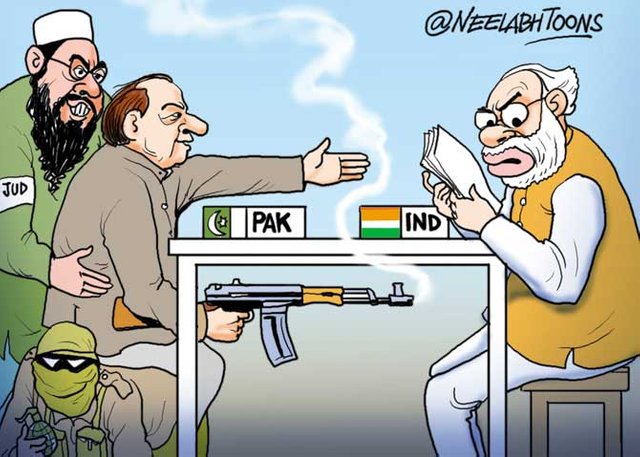Lal Bahadur Shastri, the JFK of India
This is to implore you to remember Lal Bahadur Shastri, to believe in his ideals and just for once to acknowledge how helpless can one become in a foreign land even when representing his nation.

Indians have had their biggest terrorist attack named after the American counterpart. The country knows about the great Mahatma Gandhi who was assassinated, according to the spoiled brat of a very reputed political family by the members of the RSS itself. The very own grandmother of the brat was promoted to the Prime Minister's office only after the suspicious death of the person holding the office then. John F. Kennedy died after serving for a brief period of only twenty three months, ours died after 18 months.
This is neither the time to remember the Gandhis nor it is the time to talk to about the deceased President of the United States of America. Six decades have passed after the two countries finally restored their independence and gained sovereignty. The echoes of the cries and the blood of our martyrs are still afresh, more of which is due to the partition than the struggle for Independence. Recently, at the UNGA, majority of the nations chose their side decisively and stayed with India, even terming Pakistan as a 'terror state'. Time and tide favors the strong, indeed, but the under quoted excerpt of the self-incriminating and rather irresponsible speech made by the Prime Minister of Pakistan struck me the most.
"The security council has called for the exercise of the right to self determination by the people of Jammu and Kashmir through a free and fair plebiscite held under United Nations auspices. The people of Kashmir have waited 70 years for implementation of this promise. The security council must honor it's commitment by implementing its own decisions. This General Assembly must demand that India deliver on the commitments its' leaders solemnly made on many occasions..."
Kashmir, Kashmir, Kashmir... The never ending obstinate demand of a nation that should have had its end in 1947, or 1965, or 1971 or the more recent 1999. The root cause of partition was based on caste, the world has or is trying very hard to move ahead of such petty discrimination. However, Pakistan still wants Kashmir as promised by the Indian leaders? Probing into the matter one might find that Kashmir indeed was an issue of conflict; 'was' being the decisive term here.
In 1965 after securing three times the land that Pakistani forces could capture and almost entering
into Lahore and dethroning the terror state government, the Indian force's hands were tied by the ceasefire between the countries, after the intervention of the United Nations. The result was the Tashkent Agreement, to which the entire nation was unhappy, including Lal Bahadur Shastri, the then presiding Prime Minister of India. He had promised the widowed and the nation that the war has been won not with water, but with the blood of the nation's soldiers, and he guaranteed no square meter of land won in the war would be returned to the 'terror state'. However, the Tashkent Agreement had remorse all over it, because the Prime Minister of the poor developing nation had to resort to peace.
The Tashkent conference, under United Nations, American and Soviet pressure, compelled India and Pakistan to give away the conquered regions of each other and return to the 1949 ceasefire line in Kashmir.
Prime Minister Lal Bahadur Shastri was disheartened, they say, but Kashmir wasn't lost and the failed and weak Pakistani army was exposed. The man who popularized the "Jai Jawan, Jai Kisan" slogan which resonates in the country even today. The man who was always accompanied by his wife, Lalita, on all foreign tours who personally prepared food for her husband, on this occasion was not allowed to accompany her husband. The man whose leadership influenced the successful investigation of the theft of the holy relic, which was again a conspiracy by the 'terror state' , saved Kashmir for India. The freedom fighter who led the simplest of lives and maintained a frugal lifestyle even after being elected as the Prime Minister died of a 'heart failure' on the very night of signing the agreement, they say.
If the 'terror state' demands Kashmir even now, it would only be fair for the Indian counterpart to start a probe into the alleged conspired death of its charismatic leader. The daughter and son of the deceased PM recall not the pale face of their father, but one that had turned blue, possibly from poisoning. The Indian Government has classified any files relating to Shastriji's death deeming it dangerous for its foreign relations.
Moreover, as long as we continue to dig the up the death, we will only find that the fruitless attempts of wanting Kashmir are not only demeaning for a group of people who call themselves a nation, but only the helplessness of a developing country, India, riddled with social and economic problems.